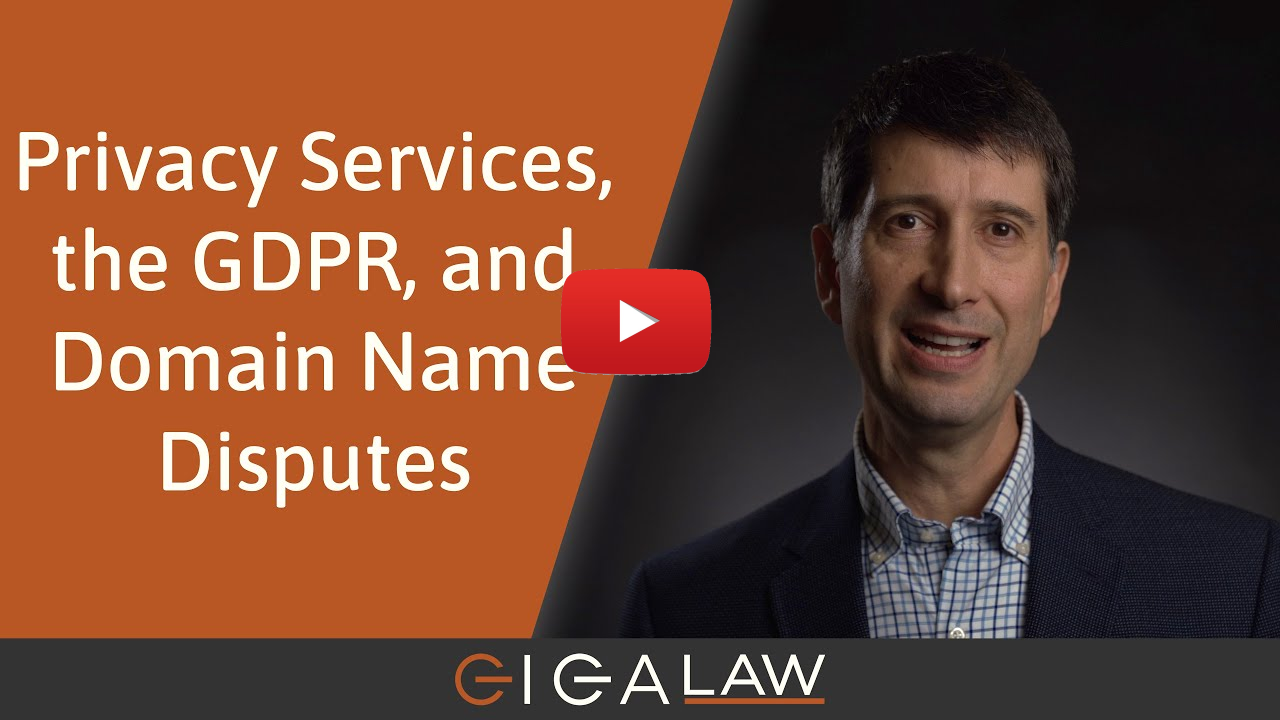“Domain Name Disputes: A Masterclass” is a 14-part series of YouTube videos from attorney Doug Isenberg of GigaLaw that provides basic and advanced information about the Uniform Domain Name Dispute Resolution Policy (UDRP) and other topics helpful to trademark owners fighting cybersquatters.
Watch each episode below or on GigaLaw’s YouTube channel, where you can subscribe to be notified of future videos about domain name disputes, including UDRP case studies.
Episode 1: What is a Domain Name Dispute?
Doug Isenberg provides an introduction to domain name disputes by explaining important aspects of the domain name system, how trademark law applies to them, what a cybersquatter is, and how disputes can be resolved through a relatively quick and inexpensive legal process.
10 minutes, 10 seconds
Episode 2: What is the UDRP?
Doug Isenberg talks about the advantages of the Uniform Domain Name Dispute Resolution Policy (UDRP), provides an outline of its important three-part test, and discusses the need to file a strong complaint.
5 minutes, 47 seconds
Episode 3: How Long Does the UDRP Take?
Doug Isenberg explains how long the typical process takes under the Uniform Domain Name Dispute Resolution Policy (UDRP) and discusses the seven steps that apply -- from complaint to decision and (usually) transfer in every UDRP case.
8 minutes, 1 second
Episode 4: How Much Does the UDRP Cost?
Doug Isenberg explains the two basic costs associated with every complaint under the Uniform Domain Name Dispute Resolution Policy (UDRP): the filing fee and the legal fee.
8 minutes, 18 seconds
Episode 5: What Type of Trademark is Required to File a UDRP Complaint?
Doug Isenberg discusses the first part of the UDRP's three-part test, which requires a complainant to prove that the domain name at issue is identical or confusingly similar to a trademark or service mark in which it has rights. As Doug explains, this requirement actually consists of two parts: First, the complainant must have rights in a trademark. And second, the domain name in dispute must be identical or confusingly similar to that trademark. This video focuses just on the first part: trademark rights.
8 minutes, 18 seconds
Episode 6: When is a Domain Name Confusingly Similar to a Trademark?
Doug Isenberg discusses the "identical or confusingly similar" requirement of the first part of the three-part test under the Uniform Domain Name Dispute Resolution Policy (UDRP), which requires a complainant to prove that the domain name at issue is identical or confusingly similar to a trademark or service mark in which it has rights.
8 minutes, 29 seconds
Episode 7: What are Rights or Legitimate Interests?
Doug Isenberg discusses the "rights or legitimate interests" requirement under the second part of the UDRP’s three-part test. As Doug explains, this test differs in an important way from the other two parts, because it requires a trademark owner to prove a negative.
8 minutes, 42 seconds
Episode 8: What is Bad Faith Under the UDRP?
Doug Isenberg discusses the "bad faith" requirement under the third part of the UDRP’s three-part test. This video explores each of the four definitions of bad faith set forth in the UDRP itself, as well as the “passive holding” doctrine.
8 minutes, 28 seconds
Episode 9: Large UDRP Complaints
Doug Isenberg discusses why and how a trademark owner can include multiple domain names in a single complaint under the Uniform Domain Name Dispute Resolution Policy (UDRP).
10 minutes, 15 seconds
Episode 10: Privacy Services and the GDPR
Doug Isenberg discusses how a trademark owner can file a complaint against an unknown registrant under the UDRP — such as when the whois record contains fake information, a registrant uses a privacy or proxy service, or the European Union’s General Data Protection Regulation (GDPR) prevents a registrant from being identified.
11 minutes, 07 seconds
Episode 11: Where to File a UDRP Complaint
Doug Isenberg discusses where a trademark owner can file a complaint under the Uniform Domain Name Dispute Resolution Policy (UDRP) and provides an overview of the six UDRP providers: the World Intellectual Property Organization (WIPO), the Forum (formerly known as the National Arbitration Forum), the Czech Arbitration Court (CAC), the Asian Domain Name Dispute Resolution Centre (ADNDRC), the Arab Center for Dispute Resolution (ACDR), and the Canadian International Internet Dispute Resolution Centre (CIIDRC).
11 minutes, 07 seconds
Episode 12: What is the URS?
Doug Isenberg explains the Uniform Rapid Suspension System (URS) and how it differs from the Uniform Domain Name Dispute Resolution Policy (UDRP). Although the URS offers some advantages over the UDRP — including lower fees and quicker decisions — it has some significant drawbacks, including that it applies primarily only to the "new" gTLDs and not to .com, .net, and .org; and that it only allows a trademark owner to obtain the temporary suspension (not the transfer) of a disputed domain name.
12 minutes, 45 seconds
Episode 13: ccTLD Dispute Policies
Doug Isenberg explains how various countries handle domain name disputes for their country code top-level domains (ccTLDs). Of the approximately 250 ccTLDs, about 40 have adopted the Uniform Domain Name Dispute Resolution Policy (UDRP), while the rest have adopted a variation of the UDRP, a different policy, or no policy at all.
8 minutes, 48 seconds
Episode 14: Domain Name Disputes: A Top 10 List
Doug Isenberg provides a top 10 list covering some of the most important topics that trademark owners should know about cybersquatting.
6 minutes, 34 seconds
















